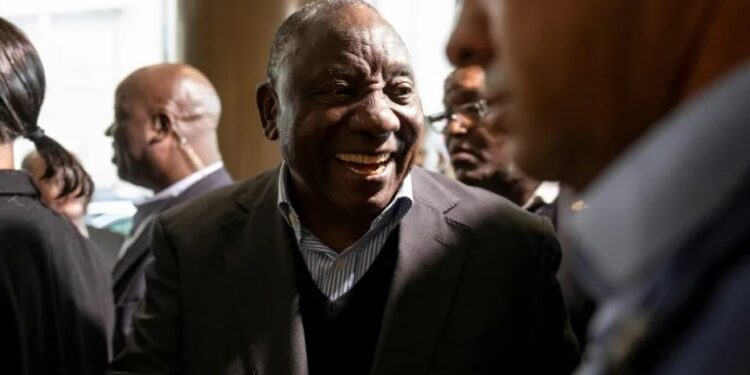South Africa: President Ramaphosa Re-elected, Coalition Government in Sight
In a turning point for South Africa’s political landscape, Cyril Ramaphosa has been reinstated as president of the nation following a new parliamentary session. His re-election comes amid a significant agreement forged between his African National Congress (ANC) party and the main opposition party, the Democratic Alliance (DA), signaling a potential shift towards a coalition government in the country.
Ramaphosa, at 71 years old, secured 283 votes in the parliamentary election, surpassing his opponent Julius Malema of the Economic Freedom Fighters (EFF) party, who received 44 votes. The announcement of Ramaphosa’s victory was made by Judge Raypmond Zondo, setting the stage for a new chapter of cooperation and unity in South Africa.
The momentous occasion was hailed as historic by leaders across party lines, with John Steenhuisen of the DA expressing optimism for working alongside Ramaphosa and his administration. The partnership between ANC and DA reflects a strategic move towards a multi-party government, aiming to foster stability and good governance, steering South Africa away from the specter of corruption that has plagued the country in recent years.
The recent legislative elections in South Africa marked a pivotal juncture as the ANC, which had enjoyed three decades of uninterrupted rule since the end of apartheid era, faced a decline in parliamentary majority for the first time. The emergence of a multi-party government comprising ANC, DA, and the Zulu nationalist Inkhata Party signifies a shift towards a more diverse and inclusive political landscape characterized by collaboration rather than domination.
The coalition government is positioned “around the center” of the political spectrum, emphasizing the importance of inclusive governance that represents the varied interests and concerns of the South African populace. The DA’s commitment to upholding values and principles as the basis for cooperation underscores the critical importance of integrity and transparency in the country’s political leadership.
Despite the positive trajectory towards a coalition government, challenges and tensions persist within South Africa’s political arena. The reluctance of some parties, including the EFF and the MK party led by former president Jacob Zuma, to join the coalition highlights the complexities and divisions that still exist within the political landscape.
The EFF’s rejection of the coalition government reflects their strong stance on issues such as land redistribution and economic empowerment, which diverges from the perceived priorities of the ANC and DA alliance. Julius Malema’s criticism of the partnership as a consolidation of “white monopoly capital” underscores the underlying tensions and divergent ideologies that influence party dynamics in South Africa.
As the ANC, DA, and Inkhata Party navigate the path towards establishing a functioning multi-party government, the importance of inclusive decision-making, respect for diverse viewpoints, and commitment to addressing the pressing challenges faced by South Africa cannot be understated. The need for effective governance, social welfare reforms, and economic revitalization remains paramount in steering the country towards a more equitable and prosperous future.
In conclusion, President Ramaphosa’s re-election and the formation of a coalition government represent a pivotal moment in South Africa’s political history, heralding a new era of cooperation and unity among diverse political factions. As the country embarks on this journey towards a shared vision of progress and inclusivity, the challenges and opportunities that lie ahead will require collective dedication, resilience, and a commitment to serving the interests of all South Africans.














































